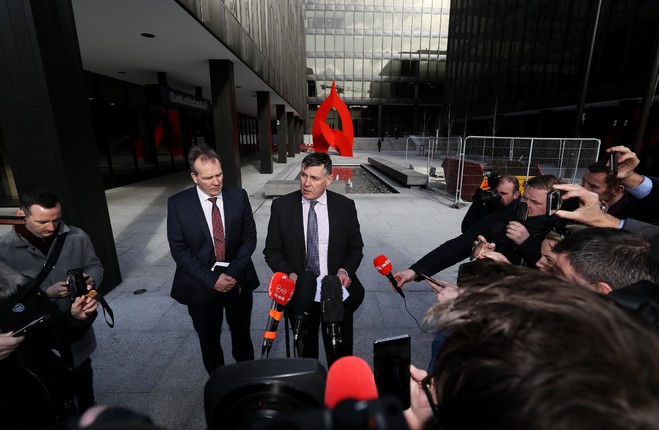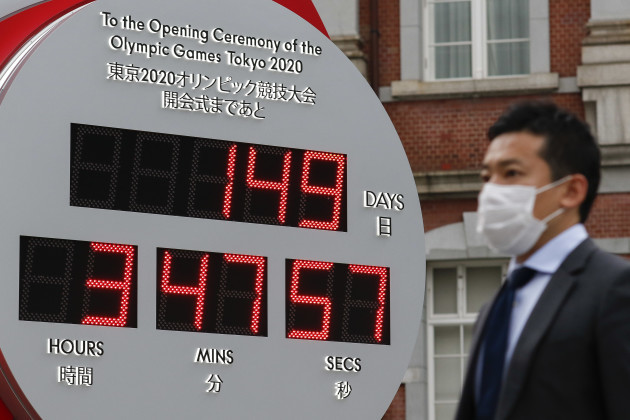ON TUESDAY EVENING, speaking live on RTÉ One’s Six One News, Minister for Health Simon Harris said that the Ireland vs Italy Six Nations match, scheduled to take place next weekend at the Aviva Stadium, should not go ahead due to the threat of the coronavirus.
The Minister said that he and his department had “made a decision in relation to mass gatherings”, and it was the “very clear view” of the National Public Health Emergency Team that the game should not go ahead in the interest of public safety. He said that the Department of Health would be contacting the IRFU to convey this.
Listeners logically interpreted this as a definitive decision on the fixture.
At a time of coronavirus-induced mass anxiety, the Minister’s words brought a degree of clarity and measured reassurance to the public—the situation is being taken seriously, containment is the priority, we have a plan that may cause some level of disruption, but we are communicating with and updating all relevant parties.
All seemed well only for two small details: nobody had told the IRFU about this decision, and to complicate matters further, it wasn’t necessarily the minister’s decision to make.
Breakdown in communications
The IRFU, evidently sore from learning of this decision from the evening news, declined to accede to the Minister’s recommendation, instead issuing a statement that sought an “urgent meeting” with Minister Harris on the “specific reasoning” behind his call for the match’s cancellation.
It went on to say that “until the IRFU has had contact with the Minister and gets an understanding of the Government’s strategic policy on travel… it would not be in a position to comment further”.
The statement made clear the organisation’s frustration at not being consulted or informed directly of the decision.
Responding, Minister Harris created further confusion by remarking that he was more than happy to talk to the sports body. However, he also added a caveat that seemed to contradict his initial statement:
“I’m not the Minister for Sport, and it’s not my job to get involved in relation to rugby fixtures or sporting tournaments. It’s my job to impart the public health advice in relation to trying to contain the spread of the virus.”
So, who’s decision was it?
There was even more ambiguity when Minister for Sport Shane Ross gave a somewhat limp endorsement of his cabinet colleague’s recommendation.
Minister Ross said that if the Department of Health, which was taking the lead on the Government’s response to the outbreak, took the view that Ireland’s Six Nations rugby match against Italy on 7 March should be called off, then his department would go along with that view.
Speaking to The Irish Times, Minister Ross suggested it was “a health issue rather than a transport or sport or any other issue, but we will take whatever step is necessary”.
Unsurprisingly, the media quickly picked up on this breakdown in communication and the many unanswered questions it gave rise to.
Confusion and chaos
In that brief window of time between the Minister’s initial Six One News interview and his subsequent meeting with the IRFU the morning after, chaos and confusion quickly ensued.
Was the match going to go ahead? Was there a breakdown in relationships between the two parties? Could the IRFU potentially defy the Minister’s decision? What would this mean for travelling Italian fans? Will the English team still travel to Rome to face Italy a week later? And of course, what does all this mean for the 51,000 fans who had bought tickets?
The next morning, in advance of his meeting with the IRFU, Minister Harris further complicated matters by suggesting that the IRFU could consider holding the fixture behind closed doors if it was a “practical option”.
This represented a third variation on his original decision in less than 24 hours; the cancellation of the game, followed by the cancellation of the cancellation, then a semi-cancellation.
Later that morning, the IRFU’s Philip Browne emerged from the Department of Health’s Baggot Street HQ to confirm that the Six Nations fixture would not be going ahead:
“We were… advised, formally, that the National Public Health Emergency team has determined that the series of matches should not proceed, in the interests of public health. The IRFU is happy to comply with this instruction.”
In effect, after almost a day of unwelcome news coverage, passive-aggressive public statements, frenetic off-the-record media briefings, and visibly strained organisational relationships, order had now been restored and the outcome of the meeting had been communicated to the necessary parties, including the general public.
Lessons for onlookers
As further cases of the coronavirus continue to mushroom up across Europe, many other sports bodies and competitions will have been watching on from a distance, crossing their fingers for a more favourable outcome.
To this end, the Cheltenham Festival has already confirmed that it will proceed as normal, meanwhile the Italian Rugby Federation remains committed to fulfilling its fixture against England in Rome on 14 March.
So what can others learn?
The coronavirus, as with any other rapidly evolving health emergency of such scale, can be very unforgiving of even the most robust contingency planning. Decisions have to be made quickly, often without all the facts. This requires sound judgement and unwavering decisiveness in the eye of a storm.
By extension, who’s doing the talking matters. Responses must be expert-led, and sometimes that requires a healthcare professional, not a politician, to take the lead. This is particularly key in the early hours and minutes of a crisis, when setting the tone is crucial.
To avoid crossed wires, there must be regular, fully-transparent communication between key stakeholders and clear, comprehensive ownership of the decision-making process.
Get this right and nobody will pat you on the back—that’s the best outcome. Get it wrong, however, and you can bet on mass confusion, soured relationships, and frenzied media interrogation.
Paddy O’Dea is a client director at PR360.


